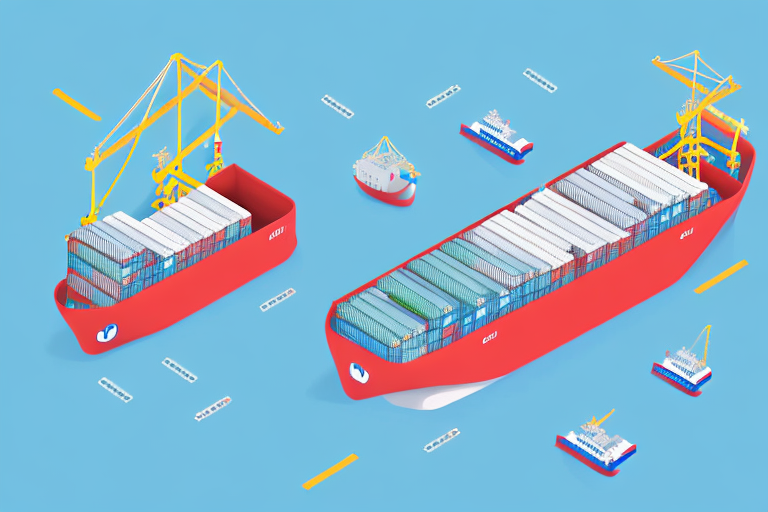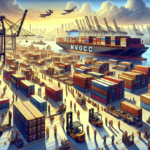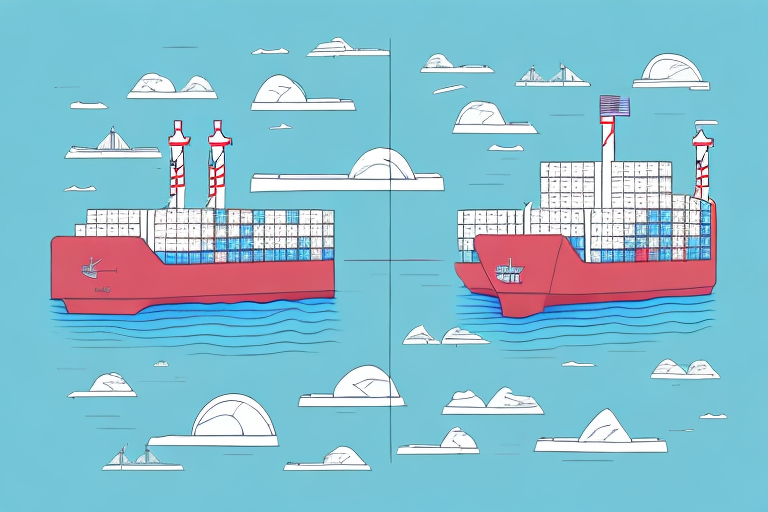What is a Non-Vessel Operating Common Carrier (NVOCC) and How Does It Impact the Supply Chain?
The logistics industry is full of complex terminology that can be confusing to those outside of the field. One such term is Non-Vessel Operating Common Carrier (NVOCC). This article aims to explain what NVOCCs are and how they impact the supply chain. By the end, readers will have a better understanding of the role NVOCCs play in international shipping and the benefits they can bring to shippers and carriers alike.
Understanding the Basics of NVOCC
A Non-Vessel Operating Common Carrier (NVOCC) is a company that provides logistics services but does not own any vessels. Instead, they collaborate with ocean carriers to offer comprehensive shipping solutions to clients. NVOCCs act as intermediaries between shippers and carriers, offering a range of services such as freight consolidation, documentation preparation, and cargo insurance.
One of the key advantages of working with an NVOCC is their ability to offer more flexible shipping options. By partnering with multiple carriers, they provide clients access to a wider range of shipping routes and schedules than a single carrier could offer. This flexibility is particularly crucial for businesses engaged in international shipping, where navigating diverse customs regulations and shipping requirements can be challenging.
Furthermore, NVOCCs possess expertise in handling complex logistics. They have an in-depth understanding of the shipping industry and can offer valuable guidance on issues such as cargo tracking, customs clearance, and compliance with international regulations. According to a Federal Maritime Commission report, leveraging an NVOCC's expertise can help businesses save time and reduce costs by avoiding common shipping pitfalls and delays.
The Difference Between a Freight Forwarder and an NVOCC
It's important to distinguish between NVOCCs and freight forwarders, as the two are often used interchangeably despite having distinct roles. While both provide logistics services, freight forwarders typically act as agents for shippers, arranging shipping and transportation services on their behalf. Conversely, NVOCCs are considered carriers and have direct responsibility for the cargo they transport.
Another key difference lies in their involvement in the shipping process. Freight forwarders are often engaged in the entire process, from packing and labeling to customs clearance and final delivery. NVOCCs, however, primarily focus on the transportation aspect, managing the movement of cargo between ports and may not be involved in other logistical elements.
Additionally, NVOCCs are mandated to obtain a license from the Federal Maritime Commission (FMC) to operate legally. This licensing ensures that NVOCCs are financially responsible and capable of providing the necessary services to transport cargo. In contrast, while freight forwarders are not required by law to obtain a license, many opt to do so to demonstrate their credibility and expertise in the industry.
NVOCC vs. Ocean Carrier: Which is Better for Your Business?
Deciding whether to work directly with an NVOCC or an ocean carrier depends on your business's specific needs and shipping requirements. If your business manages a large volume of cargo and requires dedicated vessel space for shipping, partnering with an ocean carrier may be the better choice. However, for smaller shipments or businesses seeking greater flexibility in shipping options, an NVOCC might be more suitable.
Cost is another crucial factor to consider. Ocean carriers may offer more direct routes and faster transit times, but these services often come at a higher cost. On the other hand, NVOCCs can provide more competitive pricing due to their ability to consolidate shipments and negotiate rates with multiple carriers, potentially leading to significant cost savings.
Customer service and support levels are also important considerations. Ocean carriers usually have extensive teams and resources to handle complex logistics and provide personalized support on a larger scale. Conversely, NVOCCs may offer more specialized services and a personalized approach to customer service, which can be particularly beneficial for smaller businesses seeking a closer relationship with their logistics provider.
How NVOCCs Simplify the Shipping Process for Shippers and Carriers
NVOCCs streamline the shipping process for both shippers and carriers by managing administrative tasks such as documentation preparation and cargo insurance. This allows both parties to focus their time and resources on other aspects of their business operations. Additionally, by consolidating shipments and negotiating rates with multiple carriers, NVOCCs can often secure better rates than individual shippers or carriers could obtain independently.
Another advantage of using NVOCCs is their proficiency in navigating complex international shipping regulations. They ensure that all necessary permits and licenses are obtained and that customs requirements are fully met. This expertise can prevent costly delays and penalties associated with non-compliance, as highlighted in the International Air Transport Association guidelines.
Furthermore, NVOCCs offer additional services such as warehousing, distribution, and freight forwarding. These services are particularly beneficial for small businesses that may lack the resources to manage these tasks in-house. By outsourcing these logistics functions to an NVOCC, businesses can streamline their supply chains and enhance overall operational efficiency.
Key Benefits of Working with an NVOCC in International Shipping
International shipping involves navigating diverse regulations and requirements, making it a complex and challenging process. Partnering with an NVOCC can offer several benefits to businesses involved in international trade, including:
- Access to a broader range of shipping routes and schedules
- Competitive rates through shipment consolidation and carrier negotiations
- Expertise in handling international shipping requirements
- Assistance with preparing shipping documentation and facilitating customs clearance
- Comprehensive cargo insurance coverage
Moreover, NVOCCs provide end-to-end logistics solutions, managing all facets of the shipping process from pick-up to delivery. This comprehensive approach simplifies supply chain management for businesses, ensuring smoother operations and reducing the risk of delays or mishandling. Additionally, many NVOCCs maintain established relationships with carriers and other logistics providers, further enhancing the efficiency and reliability of the shipping process.
Working with an NVOCC also grants businesses enhanced visibility and control over their shipments. Many NVOCCs offer advanced online tracking and reporting tools, enabling real-time monitoring of shipment status. This increased transparency fosters better communication and collaboration among different supply chain stakeholders, ensuring timely and secure delivery of goods.
The Role of NVOCCs in Supply Chain Management
NVOCCs are integral to supply chain management, providing logistics solutions that connect producers, shippers, and consumers on a global scale. Their capability to offer flexible shipping options and expertise in navigating intricate regulations helps streamline supply chains and reduce operational costs.
One significant advantage of partnering with NVOCCs is their ability to deliver customized solutions tailored to each client's unique needs. This includes specialized packaging, handling, and transportation services designed to meet the specific requirements of various goods. By collaborating closely with clients to understand their needs and preferences, NVOCCs ensure that products are delivered on time and in optimal condition.
In addition to logistical support, NVOCCs contribute to sustainability efforts and reducing the environmental footprint of global trade. Many NVOCCs have adopted eco-friendly practices such as utilizing low-emission vehicles, optimizing shipping routes to minimize fuel consumption, and reducing packaging waste. By prioritizing sustainability, NVOCCs help ensure that global trade remains a responsible and viable option for businesses and consumers alike.
What to Consider When Choosing an NVOCC for Your Shipping Needs
Selecting the right NVOCC requires careful evaluation of several factors to ensure they align with your business's shipping needs. Key considerations include:
- Types of Services Offered: Assess the range of services the NVOCC provides to ensure they meet your specific logistical requirements.
- Carrier Network: Evaluate the NVOCC's carrier partnerships to ensure access to the shipping routes and schedules that best suit your business needs.
- Experience and Expertise: Consider the NVOCC's industry experience and expertise in handling similar types of cargo or shipping to your target markets.
- Track Record: Review the NVOCC's history of success in your industry, including client testimonials and case studies.
- Customer Service: Assess the NVOCC's customer service and communication practices to ensure responsiveness and support when needed.
Additionally, it's beneficial to inquire about the NVOCC's technology platforms and tools, as advanced tracking and reporting features can significantly enhance your ability to manage your shipments effectively.
How NVOCCs Can Help You Save Money on Shipping Costs
One of the primary advantages of collaborating with an NVOCC is the potential for significant cost savings. By consolidating shipments, NVOCCs can negotiate more favorable rates with carriers due to their larger shipping volumes. This ability to secure bulk discounts translates to lower shipping costs for clients compared to arranging shipping independently.
Moreover, NVOCCs' expertise in managing international shipping requirements helps prevent costly mistakes and delays. Proper documentation and compliance with customs regulations reduce the likelihood of incurring fines or having shipments held up at borders. According to industry research from Alliance Logistics, businesses partnering with NVOCCs can reduce their shipping-related expenses by up to 15% annually.
Top Challenges Faced by NVOCCs in Today's Logistics Industry
Despite their essential role in the logistics ecosystem, NVOCCs encounter several challenges in today's dynamic shipping industry. Some of the most pressing issues include:
- Rising Transportation and Fuel Costs: Fluctuating fuel prices directly impact shipping costs, making it challenging for NVOCCs to maintain competitive pricing.
- Increased Competition: The entry of new carriers and logistics providers intensifies competition, requiring NVOCCs to differentiate their services effectively.
- Changing International Regulations: Continuous changes in trade policies and customs regulations necessitate that NVOCCs stay informed and adaptable to remain compliant.
- Adoption of New Technologies: Keeping up with technological advancements and integrating digital solutions into their operations is essential for maintaining efficiency and competitiveness.
Addressing these challenges requires NVOCCs to innovate continually, invest in technology, and develop strategic partnerships that enhance their service offerings and operational resilience.
The Future of NVOCCs in Global Trade and Logistics
Looking ahead, NVOCCs are poised to continue playing a pivotal role in the future of global trade and logistics. Their ability to offer flexible shipping options and navigate complex regulatory landscapes positions them as valuable partners for businesses expanding internationally.
Advancements in technology, such as automation and data analytics, are expected to further enhance NVOCCs' capabilities, enabling more efficient operations and improved service offerings. The adoption of digital platforms for shipment tracking, documentation, and communication will streamline the shipping process and provide greater transparency for clients.
Additionally, the increasing emphasis on sustainability and environmentally responsible shipping practices is likely to drive NVOCCs to adopt greener logistics solutions. This shift not only benefits the environment but also aligns with the growing consumer demand for sustainable business practices.
How Technology is Transforming the Role of NVOCCs in Supply Chain Management
Technology is revolutionizing the logistics industry, and NVOCCs are at the forefront of this transformation. Key technological advancements reshaping the role of NVOCCs include:
- Digital Platforms: Modern digital platforms facilitate real-time tracking, shipment visibility, and efficient communication between NVOCCs and their clients.
- Automation: Automation of repetitive tasks, such as documentation and cargo handling, enhances operational efficiency and reduces the potential for human error.
- Data Analytics: Advanced data analytics tools enable NVOCCs to optimize routes, forecast demand, and make informed strategic decisions that improve service quality.
For instance, some NVOCCs utilize Maersk's digital gateway to provide clients with real-time shipment tracking and automated notifications. These technological integrations not only enhance transparency but also improve the overall customer experience by providing timely and accurate information about shipment statuses.
Best Practices for Working with an NVOCC to Streamline Your Shipping Operations
To maximize the benefits of partnering with an NVOCC, it is essential to adhere to best practices that facilitate smooth and efficient shipping operations. These include:
- Establish Clear Communication: Maintain open and regular communication with your NVOCC to ensure that all aspects of the shipping process are understood and managed effectively.
- Provide Accurate Shipment Information: Ensure that all shipment details, including dimensions, weight, and handling requirements, are accurately communicated to the NVOCC to prevent errors and delays.
- Discuss Special Requirements: If your shipments have unique needs, such as hazardous materials handling or temperature-controlled storage, inform your NVOCC in advance to ensure these requirements are met.
- Set Expectations: Clearly outline your expectations regarding delivery timelines, service levels, and communication protocols to align with your NVOCC's capabilities.
- Regularly Review Shipping Processes: Periodically assess your shipping operations in collaboration with your NVOCC to identify areas for improvement and implement necessary changes.
By following these best practices, businesses can enhance their collaboration with NVOCCs, leading to more efficient and reliable shipping operations.
Understanding the Legal and Regulatory Framework Governing NVOCC Operations
NVOCCs are subject to a myriad of legal and regulatory requirements at both national and international levels. In the United States, NVOCCs are regulated by the Federal Maritime Commission (FMC) and must obtain a license to operate legally. This licensing process ensures that NVOCCs meet the necessary financial and operational standards to safely transport cargo.
Internationally, NVOCCs must comply with various regulations related to customs clearance, documentation, and cargo insurance. This includes adhering to the World Trade Organization's guidelines on international trade, as well as specific regulations imposed by individual countries where shipments originate or are destined.
Understanding and adhering to these legal frameworks is crucial for businesses working with NVOCCs, as non-compliance can result in legal penalties, shipment delays, and increased costs. It is advisable for businesses to consult with legal experts or industry associations to stay informed about the latest regulatory changes affecting their shipping operations.
Key Trends Shaping the Growth of the NVOCC Industry in the 21st Century
The NVOCC industry is evolving in response to various trends that are shaping its growth and development. Key trends include:
- Adoption of Digital Platforms and Automation: Embracing digital solutions enhances operational efficiency and improves service delivery, enabling NVOCCs to better meet client expectations.
- Expansion into New Markets and Shipping Routes: As global trade dynamics shift, NVOCCs are exploring new markets and shipping routes to capitalize on emerging opportunities.
- Emphasis on Sustainability: Increasing focus on environmentally responsible practices drives NVOCCs to adopt green logistics solutions and reduce their carbon footprint.
- Demand for Faster and More Efficient Shipping Options: Clients are seeking quicker transit times and more reliable shipping services, prompting NVOCCs to innovate and optimize their operations.
These trends indicate a future where NVOCCs are more technologically advanced, environmentally conscious, and responsive to the evolving needs of the global market.
In conclusion, Non-Vessel Operating Common Carriers (NVOCCs) play a critical role in the logistics industry by providing comprehensive logistics solutions that connect producers, shippers, and consumers worldwide. Partnering with an NVOCC offers numerous benefits, including greater shipping flexibility, cost savings, and specialized expertise in navigating complex international regulations. By understanding the fundamentals of NVOCCs and their impact on the supply chain, businesses can make informed decisions about their shipping needs and select the most suitable partners to support their growth and operational efficiency.




















